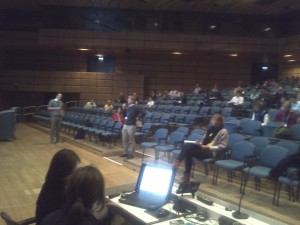Try it yourself!
Research on decision making with probabilistic forecasts is one of the HEPEX areas of interest. To raise awareness and discussion on this topic we have started “playing games” at conferences, workshops, and lectures. The games have as call-sign “Try it yourself”, referring to the set-up of the games in which the audience is given a role to play, in which water management decisions have to be made on the basis of probabilistic forecasts.
Decision making game probabilistic forecasts, Ensemble forecasting session, EGU 2013: Audience of about 175 people competing against volunteer Micha for the optimal reservoir release schedule.
The first large event where we played such a game was the EGU general assembly of 2012. In this game the audience decided, by majority vote, on whether or not to open a gate to a flood retention area. Details and findings can be found in HESS.
Response received was very positive, after which we played a second, different game at EGU again last week. Here we complicated the matter considerably by asking the audience to decide on a reservoir release schedule in monthly steps, for the high-flow season. The audience competed against a volunteer (Micha Werner (red.), see picture ). Pressure for decision making was felt as the penalty of overtopping the reservoir was presented by the moderator, Florian Pappenberger, as a clear “Game Over” situation.
Playing these games, we get feedback such as: value of probabilistic forecasts was really felt, information about the water system (e.g. climate) is needed, information about the forecasting system is needed (e.g. performance metrics), which information from the probabilistic forecasts was used, etc.
We’d be happy to get much more feedback and ideas, and examples of other decision making games that were done from you. Welcome to put here on the HEPEX blog!
Please contact us if you’re interested to know more about the examples mentioned here.
Maria-Helena Ramos
Louise Crochemore
Florian Pappenberger
Andy Wood
Schalk Jan van Andel

April 18, 2013 at 23:39
Even as the « volunteer » put on the spot I very much enjoyed the game we played at the EGU this year – as I indeed did that of last year though then in the safer environment of the audience. Indeed I think such games provide useful insight into the dilemmas of making decisions in the face of uncertainty. In fact I would also like to recommend all to volunteer to take these decisions centre stage as this adds yet another dimension; the close scrutiny of ones peers and too little time to appreciate and interpret the information provided. As a game this obviously does not come close to the reality of real world water management decisions but does suggest that there are even more aspects than the rationality of the uncertain forecast information.
Thanks for setting this up!!
Micha